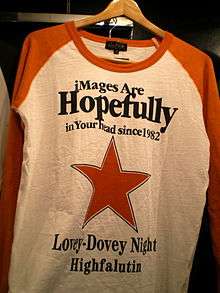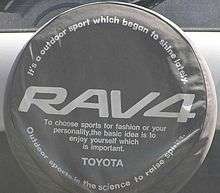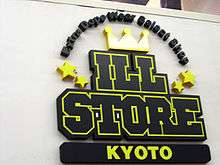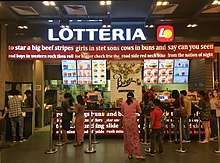Engrish
Engrish is a slang term for the misuse or corruption of the English language by native speakers of Japanese, and sometimes other Asian languages.[1] The term itself relates to Japanese speakers' tendency to inadvertently substitute the English phonemes "R" and "L" for one another, a process known as lallation, because, unlike English, the Japanese language has only one liquid consonant (traditionally romanized with "R").

The term Engrish first appears as a mispronunciation of the word English in the 1940s, but it was not until the 1980s that it began to be used to as a byname for defective Asian English.[2] The related term "wasei-eigo" refers to pseudo-anglicisms that have entered into everyday Japanese.
While the term may refer to spoken English, it can also describe written English. In Japan, it is common to add English text to items for decorative and fashion purposes. Such text is often added to create a cosmopolitan feeling rather than to be read by native English speakers, and so may often be meaningless or grammatically incorrect.
Engrish can be found in many places, including signs, menus, and advertisements. Terms such as Japanglish, Japlish or Janglish are more specific terms for Japanese Engrish.[3]
Roots of the phenomenon
There are two contributing factors to Japanese Engrish. Firstly, the two languages have significantly different grammar: Japanese word order, the frequent omission of subjects in Japanese, the absence of articles, a near-complete absence of consecutive consonants, and difficulties in distinguishing /l/ and /r/, or /θ/ and /s/ sounds, all contribute to substantial problems using Standard English effectively.[4] Indeed, Japanese people have tended to score comparatively poorly on international tests of English.[5]

Secondly, English is frequently used in Japan (and elsewhere) for aesthetic rather than functional purposes;[6] i.e., for Japanese consumption, not for English speakers per se, as a way of appearing "smart, sophisticated and modern", in much the same way as Japanese and similar writing scripts are used in Western fashion.[7] Indeed, it is claimed that in such decorative English "there is often no attempt to try to get it right, nor do the vast majority of the Japanese population ever attempt to read the English design element in question. There is therefore less emphasis on checking spelling and grammatical accuracy."[8]
Other suggested roots
English is taught in Japanese schools with an emphasis on writing and grammar over speaking. The written word is taught using romaji (Latin script); however, the correct pronunciation of the romaji letters is not taught. The spoken word is taught using katakana script. Katakana is a syllabary like hiragana, but among other uses it is used to write foreign words (not just English, but also French, German, Korean,Chinese,Hindi etc.) In some ways it is analogous to italics in Latin script. Katakana script is used in daily life for many foreign words loaned into Japanese ("Gairaigo").
Representing English phonemes in written Japanese can bring about several difficulties. For example, when representing the English phonemes R and L, one column of characters, more specifically the ラ行 (ra-gyō) is used. Since the ラ行 (ra-gyō) represents the same Japanese phoneme, there is made no distinction between R and L if used for representing English phonemes. For example, when teaching English pronunciation to Japanese students. Furthermore, as katakana is a syllabary and not an alphabet it isn't ideal for representing CVC (consonant-vowel-consonant) words or words that contain consonant clusters not present in the Japanese language. For example, the English word "start" used when referring to a race, is written in katakana as スタート (su-tā-to). The restrictions of using katakana to represent English phonemes could contribute to the adoption of "Engrish" like pronunciation when speaking English. The answer to this could be to teach spoken English using the Latin alphabet to teach English phonemes. Many Japanese people know how to write English very well, but are not confident speakers possibly due to this issue. It is common to receive a perfectly well-composed e-mail in English from a Japanese person, only to find that in person they will not attempt to speak English, preferring to apologise that they cannot speak, only write English.
In popular culture

Instances of Engrish due to poor translation were frequently found in many early video games produced in Japan, often due to the creators not having enough (or not wanting to spend enough) money for proper translations. One well-known example of Engrish in pop culture is the translation of the video game Zero Wing which gave birth to the phenomenon All your base are belong to us, which also became an Internet meme. This phenomenon is parodied in Mario & Luigi: Superstar Saga, in which the character Fawful extensively uses Engrish in his dialogue. In the Japanese version of Mario & Luigi: Bowser's Inside Story (in which Fawful also appears as the main antagonist), in the same subseries, the character Broque Monsieur also speaks Engrish.
Engrish has been featured occasionally in the Trey Parker and Matt Stone cartoon South Park, such as the song "Let's Fighting Love", used in the episode "Good Times with Weapons", which parodies the poorly translated opening theme sequences sometimes shown in anime, and in Parker and Stone's feature length Team America: World Police where the North Korean leader Kim Jong Il is depicted singing the song "I'm so Ronery".[9]
The British fashion brand Superdry, which takes inspiration from Japanese clothing styles, has established a style of placing meaningless Japanese text such as 'Sunglasses company' and 'membership certificate' on clothing sold in Britain.[10] The company explained to a Japanese television news programme that most translations were done using simple automatic translation programs such as Babelfish, without attempting to make the texts accurate.[11]
Monty Python's Flying Circus featured a parody of the drama series Elizabeth R, where they portrayed the cast riding motor-scooters and speaking Engrish, thus changing the title to "Erizabeth L".
In the 1983 film A Christmas Story, the Parker family goes to a Chinese restaurant for their Christmas dinner, and are serenaded by the waitstaff with Engrish Christmas carols, such as "Deck the harrs wis boughs of horry, fa ra ra ra ra ra ra ra ra" and "Jingre berrs, jingre berrs, jingre arr the way, oh what fun it is to ride in one-horse open sreigh!"[12]
In the Western release of the NES video game Ghostbusters (1986), players who defeat the end boss are rewarded with this message: "Conglaturation!!! You have completed a great game. And prooved [sic] the justice of our culture. Now go and rest our heroes!" [13] The misspelling, conglaturation, is often used as sarcasm toward someone who tries to succeed, but ends up failing miserably. A similar typo is seen at the end of Ghosts 'n Goblins (1986) on the NES/Famicom, where it reads, "Congraturation. This story is happy end. Thank you." In a similar vein, the Hudson Soft video game Stop the Express (1983) reads, "Congraturation! You sucsess!"[14] upon completing each level.
See also
- All your base are belong to us
- Broken English
- Dunglish, equivalent between English and Dutch
- English as She Is Spoke
- Japanese Pidgin English
- Non-native pronunciations of English
- Perception of English /r/ and /l/ by Japanese speakers
- Spanglish, equivalent between English and Spanish
- Wasei-eigo
- List of wasei-eigo
References
- Ziemba, Christine N. (December 5, 2004). "Translate at your own risk". Los Angeles Times. Retrieved 13 June 2013.
- Lambert, James. 2018. A multitude of ‘lishes’: The nomenclature of hybridity. English World-wide, 39(1): 12. DOI: 10.1075/eww.38.3.04lam
- Lambert, James. 2018. A multitude of ‘lishes’: The nomenclature of hybridity. English World-wide, 39(1): 1-33. DOI: 10.1075/eww.38.3.04lam
- Dougill, John (2008). "Japan and English as an alien language" (PDF). English Today. 24 (1): 18–22. doi:10.1017/S0266078408000059. Archived from the original (PDF) on 2016-03-17. Retrieved 2013-05-21.
- Kowner, Rotem (2003). "Japanese Miscommunication with Foreigners: In Search for Valid Accounts and Effective Remedies" (PDF). Jahrbuch des Deutschen Instituts für Japanstudien. 15: 117–151. Archived from the original (PDF) on 2014-08-01.
- Ikeshima, Jayne Hildebrand (July 2005). "Some perspectives on the phenomenon of "Engrish"" (PDF). Keio Journal of International Studies. 15: 185–198.
- Dougill, John (1987). "English as a decorative language". English Today. 3 (4): 33–35. doi:10.1017/S0266078400003126.
- Melin, Tracy; Rey, Nina (2005). "Emphasizing Foreign Language Use to International Marketing Students: A Situational Exercise That Mimics Real-World Challenges". Global Business Languages. 10: 13–25.
- Stuever, Hank (October 15, 2004). "Puppet Government 'South Park' Creators' Left Jab at Jingoism May Backfire". Washington Post. Retrieved 16 September 2011.
The North Korean dictator speaks in the voice of "South Park's" Eric Cartman, ... only with an Engrish accent. "I'm so ronery," Kim confesses in a pitiful ballad to himself, which explains his evil-doing -- he just needs to be ruvved.
- "Superdry". Unmissable Japan. Retrieved 2 October 2014.
- "Superdry: Popular UK Fashion Brand Uses Gibberish Japanese". Japan Probe. Archived from the original on 6 October 2014. Retrieved 1 October 2014.
- StarWalker13 (April 26, 2009). "A Christmas Story Chinese Restaurant Scene" on YouTube
- NES Longplay [324] Ghostbusters, retrieved 2019-09-03
- Five translations in games that will make you smile, retrieved 2019-10-12
External links
| Look up Engrish in Wiktionary, the free dictionary. |
| Wikimedia Commons has media related to Engrish. |
- Engrish.com Examples of Engrish from Japan, China and elsewhere
- fahruz.org (2003–2007) Collection of Engrish and equivalents in French, German and Italian (archived on Wayback Machine March 3, 2016)
- Large Engrish photo collection on Weird Asia News
- EngrishCheck Instagram Photos of Engrish from Japan
- Translation Party Online tool demonstrating how phrases are lost in translation between English and Japanese
